#Class of 1841
Explore tagged Tumblr posts
Text
Lisztomania | Spencer Reid x Reader
MASTERLIST
18+ MINORS DO NOT INTERACT
Summary: Years after joining the BAU, you thought you'd gotten past your little celebrity-like infatuation with Spencer, the whole reason you applied for the BAU. A case involving the murder of several groupies of an up-and-coming indie rock band is bound to prove you wrong.
Contents: NO Y/N, fem!Reader, BAU!reader, co-workers, friends to lovers, smut, unprotected sex, penetrative sex (p in v), creampie. If I missed any warnings please tell me!
4.7K words

It wasn't an everyday occurrence that Spencer would be the one to deliver the profile to the public. He looked a lot more stoic on TV than in real life. You never failed to be amazed by how he could still surprise you over the years. He looked confident, and it was a good look on him.
"-The man we're looking for is between the ages of 25 and 40. He is of an average build. He's likely socially inept and doesn't mingle well with his peers. Please be on the lookout for anybody who fits this description and contact the FBI through the local Police Department. Thank you."
"Someone's gawking." Emily's words startled you out of your Spencer-induced trance. You crossed your arms and grumbled.
"No, I wasn't..." You bit the inside of your cheek as Emily pat your shoulder and scoffed a laugh.
"Sure, you weren't. I gotta give it to you. TV does Boy Wonder well." Emily said as she watched the head of the local Police Department take over the press conference as Spencer left the screen.
"I guess I'm just amazed at how different he looks while doing press. Compared to how he usually carries himself, I mean." You shrugged. Emily turned to look at you, no longer interested in the TV screen.
"Guess that's the profiler in all of us. You can't help but compare. But you're right. Reid does have a certain je ne sais quoi about him, I suppose."
_________
That was several months ago. It wasn't until you saw Spencer in front of a classroom that a familiar, uneasy feeling returned to your stomach. Emily was right. He did 'have a certain je ne sais quoi about him'. You just couldn't put your finger on what it was.
"-Which is why it's crucial we always discuss the details of the COD with the coroner's office. COD being the Cause of Death, of course." Spencer spoke with an air of juvenile enthusiasm. You were glad he still had that part in him, despite everything that happened previous to his teaching.
He finished the class and was about to walk over to where you were leaning against the wall, waiting for him to finish. But when he was nearly done packing his satchel, a small group of college girls formed around his desk. The soft smile he'd directed at you was quickly cut short.
You stared in amazement at the girls' shameless flirting. Spencer had turned this group of brilliant and educated girls into giddy schoolgirls, all by just being himself. They all wanted a piece of him, and you started to have peace with the fact that you didn't blame them. You were in the same boat.
_________
The final straw was during a case concerning a string of murders involving groupies of an up-and-coming indie rock band.
"I mean, I get the urge to throw your panties on stage at an attractive man. I do. Even I would've taken the bait with Nick Carter, given the chance. But to follow a random stranger down a dark alley in the hopes of meeting your idol? That seems a bit far-fetched. Girls this age are smarter than that, especially with the media frenzy." JJ flipped through the details described in the case file.
"There's been several cases of fangirls going to great lengths to get what they want from their idol. The earliest case would probably be with Hungarian composer Franz Liszt in 1841.
The term 'Lisztomania' came about in 1844, describing an intense level of hysteria demonstrated by fans, a bit like the treatment of celebrity musicians today – but in a time not known for such musical excitement.
A more recent example would be Beatlemania, or even the so-called 'Bieber Fever' or 'One Direction Infection'. There have been several studies that explain this behaviour, but I won't get into that." Spencer trailed off.
"I know someone else who had a case of that. But I think that was just called a hard-on." JJ joked, jabbing at Spencer's short-lived fling with Lila Archer over ten years ago. Spencer grumbled something along the lines of "Can we please let that go," but it fell on deaf ears.
"It's still strange they would follow someone down the alley unless the person they're following has been established in the girls' minds as someone with authority, like a crew member connected to the band," Rossi mentioned.
"Garcia, look into all the current members of the band's crew along with the people working at the venues. We're going to need you at the scene, too. There's a lot of social media involved. Thank you. Wheels up in 30." Hotch stood up, signalling the meeting was finished.
You walked with Emily back to the bullpen, Spencer following close behind.
"You know, I get it. There's something attractive about a man with a platform, even if you put him on that pedestal yourself, to begin with." Emily said as you leaned against her desk.
"Yeah, for sure. It doesn't have to be a pop star or actor. A celebrity, even. Could be anybody under the right circumstances." You agreed. You could see the appeal in having an unrelenting devotion to someone like that.
You put Spencer on a pedestal like that, in a way. You watched as he gathered his things into his go-bag. You knew he was a flawed person, like anybody. Yet, in your eyes, all his problems could be explained or ignored. You didn't notice the curious glance Emily sent your way.
While on the jet, you contemplated the case. Would you have fallen for the ruse? Maybe if you had been a bit younger? You'd had your own little celebrity obsessions. You wouldn't have ruled it out if free tickets and a meet & greet were in the picture.
It was a quick but convoluted catch once the profile was made. Thank you, Penelope. The UnSub was most likely one of the band's crew members who used to date the bassist. They'd broken up due to an increasing number of groupies getting in the way of their relationship. Go figure she'd go and murder them.
The catch happened right in time with the start of the show, the bustling crowd missing all of the mayhem that had gone down backstage due to the support act. How the gigs hadn't been cancelled yet was beyond you.
"You can stay and watch the show from the VIP area if you want. It's the least we can do, really. Though, maybe ditch the FBI gear." The lead singer had a charming smile. You could see how the crowd waiting for him could be captivated by his energy.
After Hotch checked with the hotel and pilot, the team decided to take the band up on their invitation. After a quick shower and change at the hotel, you drove back to the venue in groups.
You were escorted to a barricaded area near the front of the stage. The energy of the crowd was exhilarating. An electric tension hung in the air as the 30-minute change-over between the support was filled with soft music from a playlist.
JJ and Rossi came bearing gifts, both carrying several drinks to hand out to the team. You thanked them as you took one, taking a sip of the ice-cold drink. You deserved to relax and enjoy a night like this after the gruelling case.
You watched unabashedly at Spencer, red overhead lights casting down on his face. You'd like to see how he'd do on the stage, perhaps in an alternate universe, and with a different wardrobe. He was undoubtedly eclectic enough to pull off the whole rock star gig.
He felt your gaze and made eye contact, working his way past a wildly gesturing Emily as she told a story. He lightly grabbed your upper arm when he reached you.
"Hey." You saw his mouth move, but his words got lost under the chattering crowd. You smiled and leaned closer.
"Hi! Fancy seeing you here!" You shouted. Spencer winced as he laughed. You'd obviously overestimated the volume of the crowd. You mouthed a quick apology before taking another drink.
You nearly choked when Spencer leaned even closer, invading your personal bubble (that was already narrow), to talk directly in your ear.
"Did you know that typical movement behaviour at large events like these increases the risk of spreading infectious diseases?" You bit your lip as you stopped yourself from laughing. Leave it up to Spencer to break the tension like that.
"It makes sense, I guess. Lots of people, lots of bodily fluids. Kinda gross, now that I think about it," you replied.
Just as he was about to speak again, the lights dimmed, and screams filled the stadium. You gave him a small smile, which he returned, afterwards turning to look at the show. He stood behind you for the majority of the show, and while you would've loved to admire him in the gorgeous lighting a little longer, you couldn't have asked for a better person to have rubbed up against you for an hour and a half.
After the show, Hotch, Rossi, and JJ decided to return to the hotel for some much-needed rest ahead of their early flight the following day. The rest headed out to a bar just around the corner of the venue. You walked quickly, the cold of the outside being a jarring change from the heat at the concert.
You were a few drinks in when Penelope brought up a subject you'd somehow managed to avoid all these years.
"If I hadn't joined the FBI, I would've liked to be some sort of celebrity," She mentioned, taking another sip through her straw.
"Considering the type of psychos we encounter on a daily basis, I'd rather be less known, not more." Emily shuddered. You were quick to agree. Although fame was attractive on some level, you wouldn't want to risk situations like those you'd witnessed these last few days in exchange.
"What made you want to become an agent in the first place?" Penelope turned to you before continuing. "I didn't have much of a choice, to be honest. It was jail or the FBI, and I'm not jail material. I mean, look at me!" She gestured wildly to herself.
You chuckled and decided to pick an opt-out answer. "I just saw it as the right thing to do, you know? Make the world a better place, even if it's only little by little." You shrugged.
Spencer squinted as he ran his eyes over your face. "Bullshit." He determined. Your eyebrows furrowed in confusion at his callout.
"What's that supposed to mean?" You questioned genuinely. Sure, you hadn't been entirely honest, but it wasn't a lie.
"You're lying, I can tell. You do that thing with your face. Besides, that's the most basic answer ever. Surely a person with as much integrity as you do would have a better reason than a moral superiority complex." Spencer stated matter-of-factly. You gaped at his accusation.
"He's right, though. You have no connection to the Bureau. Reid is a wunderkind, Garcia is basically an ex-con, and I'm a child of nepotism. What made you apply? And for the BAU of all places?" Emily wondered out loud.
You recoiled as you realised there was no getting out of this. If you were going to dance around the subject, Penelope would get too curious, anyways. She'd have your application and its details pulled up in no time. That, along with cross-referencing the BAU with your college, it wouldn't take a mastermind to figure out what happened.
"I actually followed a lecture on sexual sadism and the Mill Creek Killer back in college that made me wonder if I'd be cut out for it." You admitted, omitting some key details.
The one secret you'd sworn to take to your grave was that Spencer was the sole reason you were with the FBI in the first place, having followed one of his guest lectures a few years back.
He hadn't even left the room before you'd turned in your online application to the Academy.
"Why not mention that in the first place? God, no need to be so secretive about it." Penelope whined. You didn't answer as you tentatively sipped your drink, feeling busted for no reason.
You glanced up to look at an overly smug and amused Spencer. Blood rushed to your cheeks when you realised you were most definitely caught.
"You know, when Hotch first introduced us to you, I thought I recognised you from somewhere. But the memory I have of that lecture is actually overshadowed by this kid who was also there, Nathan Harris. He ended up killing some prostitutes. But now that you mention it, you did go to Georgetown, didn't you?" Spencer knew he was right. He just wanted to see how you were going to talk yourself out of this one.
"Oh, you gave that lecture? I never realised..." It was a pathetic lie, and there was no hiding it. Emily snorted out loud. She'd clocked your little 'thing' for Spencer long ago, you knew that much.
"Aww, you looked up to Spencer? That's so cute!" Penelope gushed. That sure was one way to put it. You made a face that must've said as much.
"What, you didn't look up to me? I'm offended. Here I thought I was your favourite professor." Spencer joked. He excused himself as he walked to the bathroom. Great timing, as it gave you time to rid your cheeks of the flush you were sporting.
"Be honest with me. And don't bother lying because we've all seen the heart eyes you throw at Pretty Boy. Were you genuinely interested in joining because of the subject matter? Or..." Emily encouraged you to answer.
You sighed as you brought a hand to your face. "Honestly? I wasn't sure if I wanted to be him or be with him. But at least I signed up for the class out of genuine interest! There were plenty of girls there that were there purely for the hour-long eye candy!" You defended yourself.
"And you applied for the Academy after the lecture? At least it must've been interesting." Penelope wondered out loud.
"Actually..." You winced. "He'd hardly even been done with his introduction before I'd filled in the online application. But I was very single, okay? And he'd already built up this celebrity status on campus." It felt nice to admit to it after years of harbouring it.
"Oh! You naughty little fangirl!" Penelope exclaimed.
"I'm not a fangirl! It's been years!" You groaned. You took it back. It didn't feel nice. You should've kept it to yourself.
"Who are you a fangirl of?" Spencer asked, putting a new glass in front of Emily and sitting back down by your side.
"You! She's a total groupie." Penelope betrayed you. You shot her a nasty look, but it went ignored by her drunken, self-satisfied glee.
"Is that so?" Spencer turned to you with his eyebrows raised.
"Oh yeah, total Reidiac. You should give her an autograph." Emily winked. Spencer laughed and shook his head at their antics.
The conversation moved on, but you felt the dynamic between Spencer and you had changed, even when unspoken. When Penelope and Emily were caught up discussing cats, Spencer leaned against your side, whispering in your ear once more. Unlike last time, he didn't break the tension, even when telling another fact.
"Garcia called you my groupie earlier. Do you know the textbook definition of the term 'groupie'?" His voice was huskier than usual, coated with the alcohol and late hour. You shook your head timidly, urging him to continue.
"A groupie is typically explained as a young woman who regularly follows a celebrity, especially in the hope of having a sexual relationship with them." His lip brushed against your ear as he whispered the words. A cold chill went down your spine at his insinuation.
"You're no celebrity, Spence." You answered apprehensively. He didn't move, still leaning into your side, out of sight. You couldn't gauge his expression.
"Maybe not in the classic sense of the word. But I have a Wikipedia page. Surely, that amounts to some celebrity status." He joked. You closed your eyes, tension slowly disappearing after the vibe of the conversation changed back to casual banter.
Was he insinuating what you thought he was?
You got your answer as soon as the four of you headed to the hotel. You bid your goodbyes to Emily and Penelope before turning to put the keycard in the door to your room. You heard a couple of doors close, and just when you turned the handle, there was a hand on your shoulder, pushing you inside and closing the door. You whipped around, only to be faced with Spencer.
"Spenc-"
"You deflected earlier." He interrupted.
"Deflected what?" Your heart was racing. Whether from the shock of his sudden intrusion or the proximity, you weren't sure.
"The definition of a groupie. And how Garcia is right, you totally are one."
You gaped at the insinuation.
"Don't look shocked now! You are totally one of those girls who audit my class." He grinned.
"You wish! I'll have you know you were scrawny at best when you gave that one lecture I attended." You huffed, crossing your arms.
"Were scrawny? Past tense?" Spencer egged you on.
"Shut up. You know you've built up some muscle since then. Hell, maybe you even grew a couple of inches." You rolled your eyes.
Spencer decided to ignore the comment and put his hand in his pocket, fishing for something. He finally pulled something out, looking way too smug for his own good. "I brought a Sharpie. You know, for your autograph."
Fine. If he wasn't going to stop this ridiculous teasing, you were going to cross the 'groupie' line.
"Oh my god! I like, totally want your autograph, Spency!" You started, looking him dead in the eyes as your hands made their way to the hem of your shirt.
"Will you sign my tits?" You challenged, lifting your top far enough to expose your bra to its fullest extent.
Spencer obviously hadn't expected that, struggling to come up with a quick-witted response. You shrugged as you took the shirt off.
"I see. You require a larger surface area. I get it. Big ego, bigger signature." Spencer finally broke when you reached behind your back to unclasp your bra.
"Hey, hey. Stop. I can sign them like this just fine, sweetheart." You knew he was simply going along with the rockstar act, but the nickname sent blood rushing to your cheeks either way.
"Okay, hot shot." You smirked, pushing your chest out. He hadn't expected you to actually let him sign your chest. He scrambled to take the cap off. He stepped closer and wrapped an arm around your waist, pulling you against him.
"Stand still. You want it to come out perfect, don't you?"
You held your breath when he brought the Sharpie up to your breasts. You looked at his face as he appeared laser-focused on giving you the best autograph of your life. Why was it that such a stupid joke felt like the most sensual experience of your life?
The tip of the Sharpie tickled as it danced across your chest. He finished the signature with a dot on the I in Reid.
"There, perfection." He whispered, but his eyes were no longer glued to your scantily clad upper body. You searched his face for hesitation but only found his determined gaze settled on your parted lips.
He made eye contact as if asking permission. You'd barely nodded before his hands cupped your face, and lips were on yours, sucking all the air out of your lungs. His body pressed up against your own, frantically shedding the layers keeping you separated. You kept kissing him while desperately reaching for his belt.
You hadn't noticed you'd slowly made your way to the bed in the back of the hotel room until Spencer pulled away to remove his tie. You let yourself fall onto the sheets, ridding yourself of your bottoms. They got stuck at your ankles as you forgot your shoes.
"I got it." Spencer's voice was unrecognisably hoarse. He kicked off his own shoes and made his way over to the bed in only his boxers. He tugged at your shoes after undoing the laces and discarded them somewhere in the room.
You'd never seen a sight quite like Spencer leaning over you as he rested one knee on the bed. He put his hand beside your face and you met his eyes. His head blocked the dim yellow ceiling light, lighting him perfectly from behind. It was ridiculous how angelic he could look, even in these stereotypically sinful circumstances.
"Are you sure about this?" Spencer asked. Always considerate. What a gentleman.
"I've been sure ever since that stupid lecture, dork." You joked. Spencer smiled and leaned down, placing a kiss under your ear. His breath was hot on your neck as he left a trail of kisses down your neck, down to his crudely placed signature.
You leaned on your elbows as Spencer reached behind your back to finally unclasp your bra. You let your back meet with the sheets again as he pulled the straps down your arms. You heard him take a deep breath as he took in the sight before him.
You pulled him down for another kiss, unsatiable now that you'd gotten a taste. His hands reached for your chest and experimentally pinched a nipple. You inhaled sharply through your nose. The combined sensation of his mouth and large hands on your body, as his hips sought more and more friction, was delectable.
His hands slowly reached further down, toying with the edge of your underwear.
"Don't tease." You whined, already too riled up.
"Patience is a virtue," Spencer murmured against the skin of your jaw, hooking his finger under the elastic band.
"Patience, my ass, Reid. I need you." It came out more desperate than you intended, but it seemed to do the trick. He yanked the underwear down your legs, followed by his own.
"Condom?" He asked. You shook your head.
"Don't care. I'm clean, and God knows you are. Wanna feel you." You answered, wrapping your arms around his neck.
"What's that supposed to mean?" Spencer laughed, taking his cock in his hand and running it through your folds.
"Have you met yourself? You won't even shake hands, Doct-oh, oh Jesus Christ." Spencer interrupted your banter by sliding inside in one go. You closed your eyes as you pulled him close, begging him to kiss you.
He slowly started moving as you regained your ragged breath. The low grunts falling from his lips against yours were magical, but you wanted more. Your fingers made their way up to his hair, tentatively tugging at the roots. Your grip tightened at a particularly harsh thrust, and Spencer's response was everything you were searching for.
"Holy fuck, oh my God- Uh-" His grunts slowly tuned whinier as you kept your grip on his hair. He brought a hand to your clit, rubbing circles in tandem with his thrusts.
"Look at me, baby." He moaned in your ear. He leaned back, and your eyes fluttered open, though with difficulty. Your instinct was to squeeze them shut with pleasure. He looked ravenous, pupils blown wide, panting with the physical effort.
You lazily wrapped your legs around his waist in an attempt to pull him even closer.
"Shit, Spencer," you moaned as the new angle reached a spot inside you you'd only ever dreamed of. Your eyes squeezed shut again, unable to keep them open. Spencer removed the hand rubbing your clit and moved it to your chin, placing a small kiss on your lips.
"Eyes on me, come on. I know you can do it." He encouraged. Something about his coercive tone let you know there was a side to Spencer you had yet to see. You opened your eyes and were met with the sight of his eyebrows furrowed with effort.
The noises coming from Spencer sped up along with the desperate pace of his hips. The combination of his whines with yours and the sound of skin on skin was anything but serene. You felt yourself nearing the edge, clawing at his back in an attempt to ground yourself.
"Spencer! Fuck, oh my god," it was hardly distinguishable what you were saying, mumbles of pleasure stringing together into an unintelligible mess. His cock slid again and again and- you couldn't take it.
Your hands left his hair in favour of running your nails harshly over his back. Spencer was seemingly a glutton for pain, moaning at the sensation.
"I- Shit, I'm gonna cum. D'you want me to pull out?" Spencer's thrust faltered. You knew you had to answer fast. You tightened your grip on him with your legs.
"Please, Spencer. Please come inside me. Want to feel you cum." You begged.
"Fuck, okay. Okay. O-" His head dropped down to your shoulder as his unrelenting hips sped up one more time, bringing you both to your high. You felt his cock twitch as your walls tightened around him.
"Spencer!" You shouted as you came, feeling him spill inside you.
"So good for me. So gorgeous. Perfect." Spencer mumbled as he peppered you with kisses, hips slowing down as he came down from his high. Your chest heaved, trying to catch your breath.
Spencer carefully pulled out, making sure not to spill anything and soil the sheets. He stepped off the bed and spread your legs, before leaning back down and licking a drop of cum threatening to spill.
"Shit, Spencer! Too sensitive!" You pushed his head away. He laughed before heading to the bathroom, returning with a dampened towel.
The nighttime routine that followed felt domestic. You peed, brushed your teeth, ignored the sight of his signature and hickies on your boobs, and headed to bed.
"Can I borrow your toothbrush?" Spencer asked from the bedroom. He hadn't asked to stay. But then again, you hadn't asked him to leave. You didn't want him to.
"You just licked your own cum from my vagina, and you ask if you can borrow my toothbrush? Be my guest, Reid." You scoffed, lying down under the sheets.
"Hey, people have their preferences, okay? Didn't want to overstep." Spencer said as he returned from the bathroom, lying down beside you.
Against your better judgement, Spencer stayed. You knew the entire team would be up and around, bright and early. But you didn't care. His arms wrapped around you and pulled you close as you drifted off into a peaceful sleep.
He left early the following morning. You were sure he hadn't had nearly enough beauty sleep. He could nap on the plane, you shrugged. There were no regrets from either party over the loss of sleep.
You hadn't thought too much about your outfit before heading down to breakfast. An honest mistake one can make when staying up late and getting up early. You were exhausted, let alone hung over. You realized your mistake when the ever-stoic eyes of Aaron Hotchner immediately snapped down to the tank top you were wearing the second you stepped out of the elevator, the words 'Spencer Reid' still obscenely sprawled across your chest, accompanied by several suspicious bruises.
Your eyes went wide as you followed his gaze, quickly zipping up your hoodie. How could you possibly have forgotten that part? You met Hotch's eyes. Before you could try to babble yourself out of this one, he held up a hand to stop you. "I don't want to know."
You clenched your lips as you nodded. "Noted, bossman."
The small smile tugging at the corner of his lips didn't escape you, and neither did the exchange of money between him and Rossi not 5 minutes later.
#spencer reid x y/n#spencer reid x you#spencer reid x reader#spencer reid smut#spencer reid fanfiction#spencer reid#dr spencer reid#spencer reid fluff#criminal minds fanfiction#criminal minds x reader#criminal minds smut#criminal minds fic#criminal minds fanfic#smut#criminal minds fandom#criminal minds#matthew gray gubler#mgg#mgg smut#mgg x you#mgg x y/n#mgg x reader#mgg fanfiction#mgg fic#fic recs#mydearzero
2K notes
·
View notes
Text
Writing historical fiction is awful it's like day 1 yayyayayay a wee man just for me! day 200 FUCKKKKKKK what was the methodology of this graph of fourth class housing and quality-adjusted persons per acre in ireland circa 1841 I need to know before I can write the characters RAWING EACH OTHER
92 notes
·
View notes
Text
I know I spent two days without posting any lesbian pride post lol but I swear I'm gonna post two posts per day in the following days to make up for it. I am again going to talk about an artist, but from a different period this time.
Rosa Bohneur !
(I love her name by the way... Bohneur means happiness in french and that's such a pretty name to have)
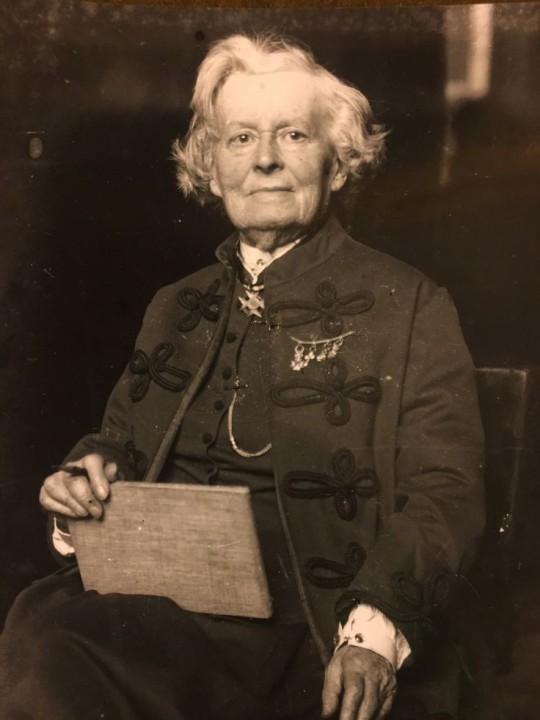
Marie-Rosalie Bonheur, known as Rosa Bonheur, was born in 1822 in Bordeaux and died in 1899 in Thomery. She was a French painter and sculptor specialising in representations of animals.
She has kind of an interesting family story (mother adopted by a rich guy who found out later who was her real father, siblings all artists, father who met a lot of interesting people, links with many famous people...) but it would be too long to talk about it and I want to focus on Rosa herself. Do check it up if you're interested!
During her youth, Rosa Bonheur had a reputation for being a tomboy, a reputation that followed her throughout her life and which she made no attempt to deny, wearing her hair short and later smoking cigarettes and cigars. Her emancipated lifestyle never caused a scandal, even though she lived in an era that was very concerned with convention. Like all women of her time, Rosa Bonheur had to apply to the Prefecture of Paris for a cross-dressing permit, renewable every six months, in order to wear trousers, in particular to attend livestock fairs, travel or ride horses.
Here's one of her permits, from 1857 :
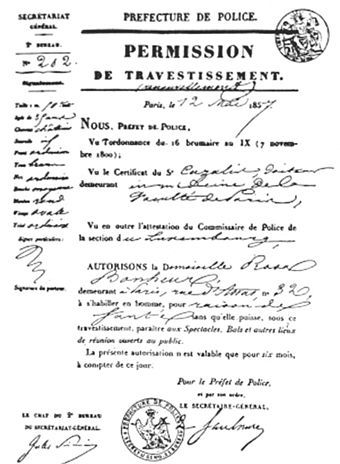
And though many historians tried to deny the fact that she was a lesbian, she always refused to marry a man, has only ever had relationships with women and literally wrote that she never felt any sort of love, attraction or tenderness for men, "besides a frank and good friendship for those who had all my esteem". After the death of the woman she loved, she also wrote "If I'd been a man, I'd have married her, and they wouldn't have made up all those silly stories..." You got it : even if she didn't shout it from the rooftops, Rosa was very probaby a homosexual woman.
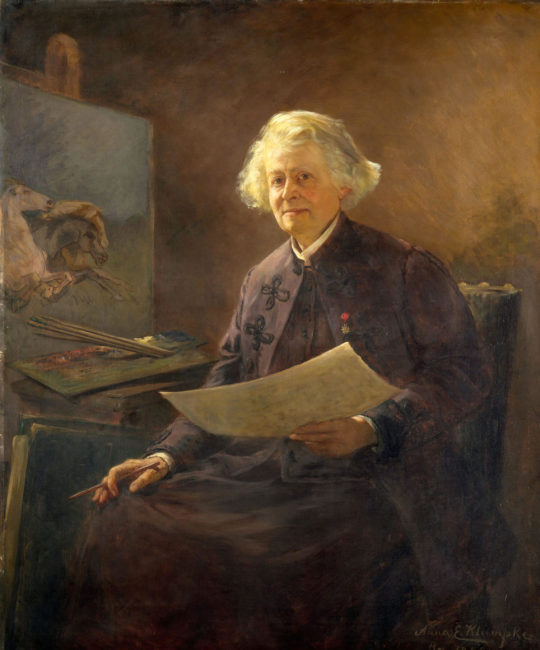
Rosa Bohneur grew up in a fairly wealthy family, thanks to the financial support of her mother's adoptive father. But when her mother's father died, the family was left without any such support, and fell into dire poverty. When Rosa was 11, her mother died, which deeply traumatised her. She kept a lifelong admiration for her mother.
In 1836, at the age of 14, she met Nathalie Micas, who became her lover. Only Nathalie's death 53 years later separated them.
Her father remarried in 1842 to Marguerite Peyrol, with whom he had a last son, Germain, who would also become a painter. Rosa Bonheur did not get on well with her stepmother and when her father died in 1849, she left the family home to live with the Micas.
After her mother's death, Rosa Bonheur went to primary schools, was apprenticed as a dressmaker and then went to boarding school. Eventually her father took her into his workshop, where her artistic talents were revealed. He was her one and only teacher. Gradually, she developed a passion for animal art, which became her speciality.
She exhibited for the first time, at the age of 19, at the Salon of 1841. She won a 3rd class medal at the Salon of 1845, and a 1st class medal (gold) at the Salon of 1848. This award enabled her, at the age of 26, to obtain a commission from the State to produce an agrarian painting (paid 3,000 francs). The painting resulting from this state commission, "Labourage nivernais" was supposed to go to the Musée des Beaux-Arts in Lyon. But it was so successful at the 1849 Salon that the Beaux-Arts department decided to keep it in Paris, at the Musée du Luxembourg. After Rosa Bonheur's death, the work went to the Louvre, before being transferred to the Musée d'Orsay in 1986.
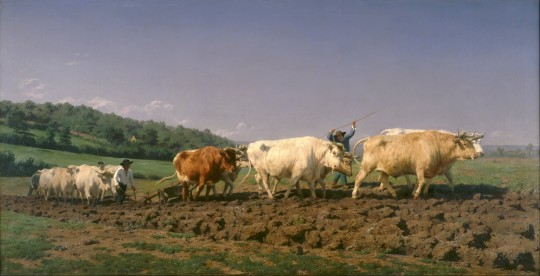
When her father died in March 1849, Rosa Bonheur replaced him as director of the École impériale gratuite de dessin pour demoiselles (or École gratuite de dessin pour jeunes filles). She remained in this position until 1860: ‘Follow my advice and I'll turn you into Leonardo da Vinci in skirts’, she often told her pupils.
In 1860, she moved to a huge house in By, where she had a huge workshop built, and ample space for her animals. One of her relatives wrote: “She had a complete menagerie in her house: a lion and a lioness, a deer, a wild sheep, a gazelle, horses, etc. One of her pets was a young lion she let run around. My mind was freer when this leonine animal died".
In June 1864, Rosa was visited by Empress Eugenie, who invited her to lunch at the Château de Fontainebleau with her husband. The following year, Eugenie returned to see her, to present her with the Legion d'honneur herself. Rosa is the ninth woman and the first artist to receive this distinction. About this, The Empress said :
“At last, you've been knighted. I am delighted to be the godmother of the first woman artist to receive this high distinction. I wanted the last act of my regency to be devoted to showing that, in my eyes, genius has no sex."
She was also the first woman to be made an officer in this order, in April 1894 (first female officer of the Legion d'honneur).
Rosa traveled extensively with her lover Nathalie, herself a painter and mechanical enthusiast (she invented and patented a railway braking system), and painted many pictures inspired by her travels.
In 1889, Nathalie died after some 50 years together. It was then that Rosa expressed her regret at not having been able to marry her.
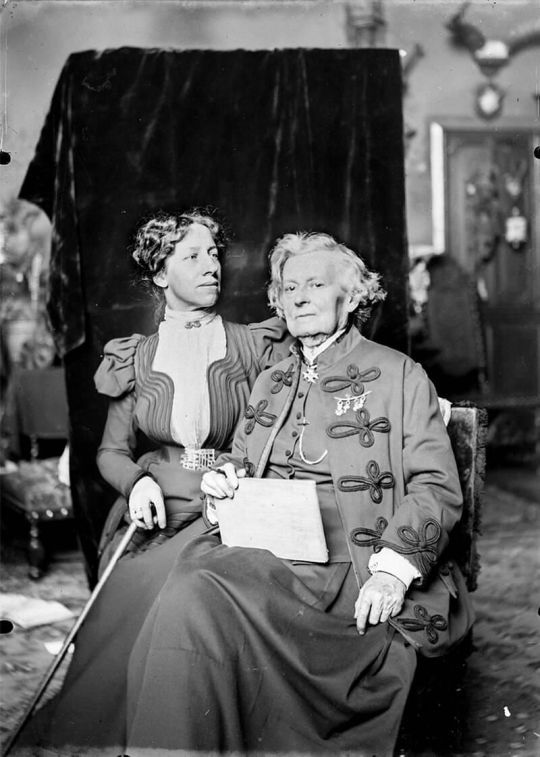
After Nathalie's death, Rosa met Anna Klumpe, a talented American painter. The two women moved in together some time later.
Rosa Bohneur died of pulmonary congestion in 1899, without having completed her last painting, “La foulaison du blé en Camargue”, a monumental canvas she had planned to exhibit at the 1900 Universal Exhibition.
She is buried in Père Lachaise cemetery, alongside Nathalie, her parents and Anna (who died years after her). She left her entire fortune to Anna, who, in 1908, published a biography of Rosa Bonheur and created a Rosa-Bonheur prize at the Société des artistes français. The Société des Artistes français posthumously awarded her the Medal of Honor shortly after her death.
Rosa could have had military honors at her funeral, but she specified in her will that she did not wish this.
There's a lot of interesting things to say about Rosa, her art and her history, so I suggest you do some research on her! She was a very talented and strong-willed woman who had a huge impact on French art and left a considerable cultural legacy.
Here are some of her paintings :
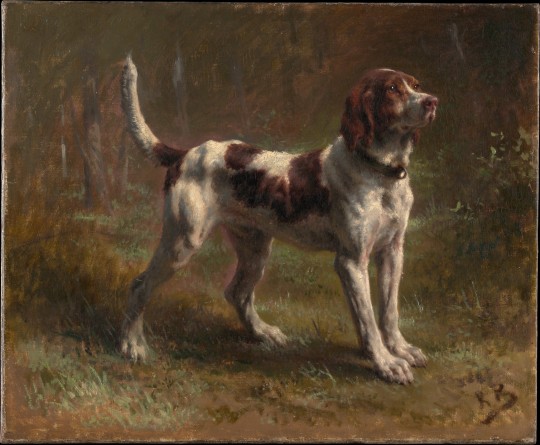
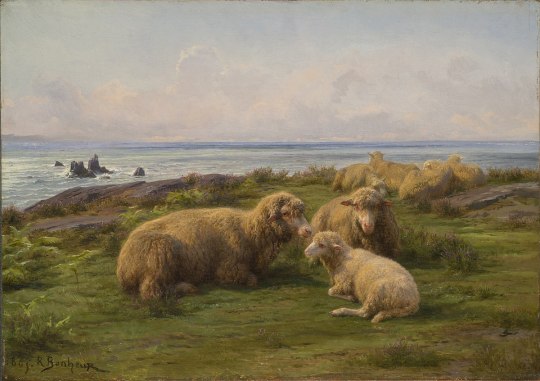


I personally love them ! I am not a painting expert, I just find them sooo pretty.
See you tomorrow :)
#lesbian#lesbian pride#pride#pride month#female homosexual#female homosexuality#rosa bonheur#french art#painting#art#lesbian history
235 notes
·
View notes
Text

The loss of the frigate Sémillante by Jean-Yves Delitte, 2024
The Sémillante was a Surveillante class 60-gun first rank frigate of the French Navy. Built t Lorient she was launched on 6th February 1841.
Sémillante took part in the Crimean war from 1854 as a transport.
In February 1855, under Captain Jugan, she departed Toulon with a crew of 301 and 392 soldiers as reinforcements for the French army. On 15th February 1855, in the Strait of Bonifacio near the Lavezzi Islands(the Strait of Bonifacio seperates Sardinia from Corsica), Sémillante was caught in a storm. Lost in a thick fog, a gust of wind drove the ship into rocks on Ile Lavezzi, the main island of the archipelago. The ship sank around midnight with all hands.
For weeks, bodies of the victims washed up on the shore of Île Lavezzi. The remains of 600 of the people on board were eventually recovered and buried in the Achiarino cemetery on the island. Only the captain's grave is marked by name. A 27-foot-high pyramid of boulders was built as a remembrance of the disaster.
The wreck is cited as a triggering event that raised public awareness of naval disasters and spurred the creation of coastal rescue organizations.
151 notes
·
View notes
Text

The image depicts the painting "Young Woman Sewing" by Pierre-Auguste Renoir.
Artist and Date: The work was created by Pierre-Auguste Renoir (1841-1919) in 1879.
Medium and Dimensions: It is an oil painting on canvas, measuring 61.4 × 50.5 cm.
Theme: The painting shows a middle-class woman embroidering a fabric, representing a scene from the daily life of a 19th-century French bourgeois woman.
Notable Features: Renoir used vibrant colors, an atmosphere full of light and free brushstrokes, with emphasis on cobalt blue and striking contrasts of red and touches of yellow.
Context: The painting is believed to have been executed in the late summer of 1879, during Renoir's first stay at the Château de Wargemont, the home of his patron Paul Berard.
#art#art history#classical art#painting#oil painting#history of art#art blog#european art#women in art
33 notes
·
View notes
Text

Sunset Valley Victorian. my edit
Edited for personal use from the save file I shared.



Now, I'm starting afresh. I've just built a new house, so I'm going to live there. The Langerak family live next door.




There are 90 Sims living in this town. I don't really understand the British class system, but there is a rough division between wealthy and less wealthy areas (they have different vehicles and clothes).The only noble families are the Goth and the Crumplebottom.


"Harbor View Park"
The park with these stairs was built to access the harbor.

The staircase was modeled after the Potemkin Stairs in Odesa, Ukraine, which was completed in 1841. The real thing is much larger, but it's an incredible staircase made famous by Sergei Eisenstein's 1925 silent film Battleship Potemkin.


A person looking down the stairs will only see the landing, while a person looking up the stairs will only see the stairs and will not see the landing.





This park does not have many objects for Sims to play in all day, but Sims gather there and can have fun sitting on benches and chatting.

Oh, it looks like there's a steamship anchored in the harbor.

thank you for reading. see you.
#the sims3#ts3#sims3#ts3 screenshots#ts3 simmer#sims 3 simblr#sims 3 gameplay#sims 3 build#sunset valley#ts3 scenery#ts3 custom world#ts3 victorian
111 notes
·
View notes
Text
A ‘Majorcan’ Concert at the Salle Pleyel
Including a review by Franz Liszt (or Daniel Stern)
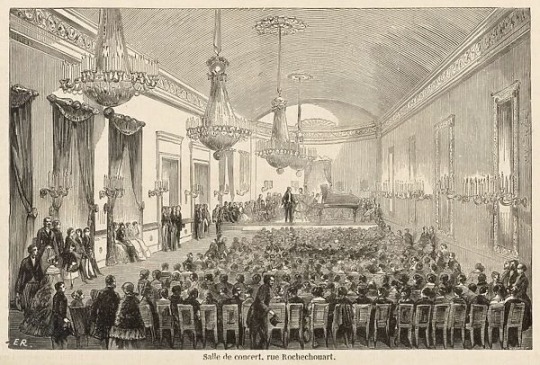
Salle de Pleyel, rue Rochechouart. Pre-1855.
On the 26 April 1841, I gave a concert at the Salle Pleyel in Paris. Also participating were two other artists, the violinist Heinrich Wilhelm Ernst and the soprano Laure Cinti-Damoreau, who performed between my pieces. The concert was given the epithet ‘Majorcan’ given that the programme included many pieces composed during my winter there with Sand. The programme included my Préludes op.28, Scherzo in C# minor, Polonaise in A major, Ballade in F major, mazurkas, etudes and nocturnes.
The audience was filled with the elites of the art world, including many of my acquaintances such as Berlioz, Liszt, Kalkbrenner, Mickiewicz, Heine, Delacroix, as well as the critics Ernest Legouvé and Léon Escudier.
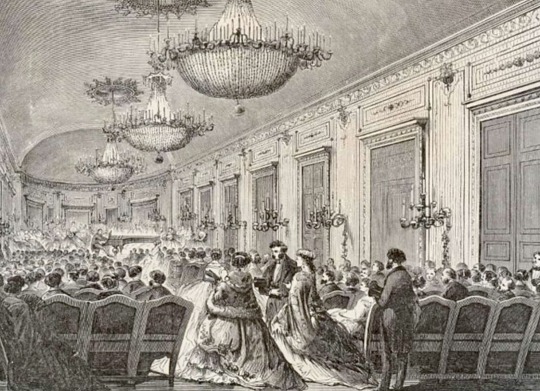
Maison Pleyel Hall, Édouard-Antoine Renard. 1855.
From the concert, I earnt 6,000 francs, 6x the average annual income of a working-class family at the time. Ridiculous, perhaps, but it certainly kept me very comfortable over the summer.
Personal Affairs
In the months prior to the concert, there had been tension brewing between Liszt’s paramour, Marie d’Agoult, and my own partner, George Sand.
D’Agoult believed Sand had feelings for Liszt and was starting to dislike her brusque and promiscuous behaviour, while Sand found d’Agoult's fastidiousness irritating. D’Agoult supposedly sent unflattering letters about Sand's promiscuity, creating a rift between the friends. Meanwhile, having travelled with both d’Agoult and Liszt to Switzerland, Sand had been inspired by the story of d’Agoult fleeing her aristocratic, but stifling husband in favour of an affair abroad with Liszt. The story would have made a great novel, but as Sand was friends with d’Agoult, she gave the novel idea to Balzac.
In 1839, Balzac published "Béatrix," portraying both d’Agoult and Liszt in a cruel manner. (George later published "Horace," anyway, which told a similar story, depicting d’Agoult unfavorably). By the end of the year, d’Agoult and Sand’s friendship had completely broken down, with each feeling wronged by the other.
Nowadays, their quarrel leading up to the Majorcan Concert can be read in private correspondence:

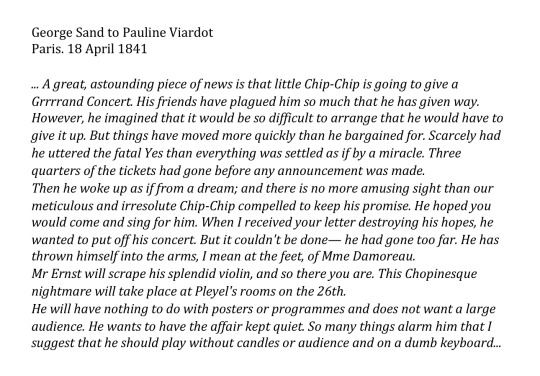

With this in mind, I was quite disappointed when I found out Liszt would be reviewing my concert, not Legouvé, who had been my first choice.
When Legouvé told me this news, I replied, “I wish it were you.” To which he said, “You don't mean that, my dear friend! An article by Liszt is good fortune for the public and for you. Trust his admiration of your talent. I promise you he'll make you a beautiful kingdom.” “Yes,” I smiled, “In his empire!”
As frustrated as I was, Liszt was there on the night of the concert, watching avidly.
Below I provide a translation of his article.
Concert at Salle Pleyel • 26 April 1841
— Review by Franz Liszt.

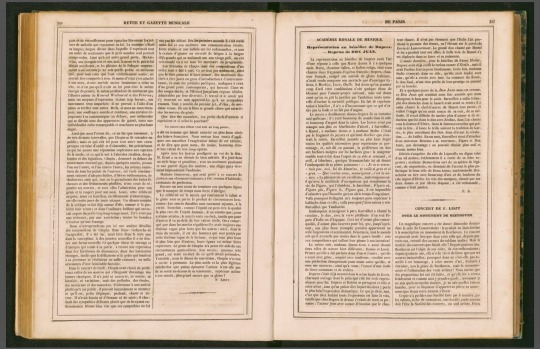
Review of Chopin’s concert by Franz Liszt. 2nd May 1841. Gazette Musicale.
CHOPIN’S CONCERT
Last Monday, at eight o'clock in the evening, M. Pleyel's rooms were splendidly lit; numerous carriages were constantly bringing the most elegant women, fashionable young men, celebrated artists, richest financiers, and the most illustrious noblemen to the foot of a staircase, which was covered with carpet and perfumed with flowers. A whole social elite, a whole aristocracy, by blood, money, talent, and beauty.
A grand piano was open on a platform; everyone crowded round, eager for the closest seats; they settled down to listen, they composed themselves, they said to themselves that they must not miss a chord, a note, an intention, a thought from he who was going to sit there. And they were right in being so eager, attentive, and religiously moved, because the man for whom they waited, whom they wished to see, hear, admire, and applaud, was not only a skilled virtuoso, a pianist, expert in the art of note-making, not only an artist of great renown, he was all this and more, he was Chopin.
Arriving in France around ten years ago, Chopin, among the crowd of pianists who at that time were flocking from all parts, did not fight to obtain the first or the second place. He seldom played in public; the famously poetic nature of his talent did not lead him that way. Like those flowers, which only open their fragrant chalices in the evening, Chopin required an atmosphere of peace and reverence to enable him to freely pour forth the treasures of melody from within him. Music was his language; a divine language, in which he expressed a whole array of feelings that only few could understand. Just like that other great poet, Mickiewicz, his compatriot and friend, the muse of his homeland dictated his songs, and the sorrow of Poland lent a kind of mystic poetry to his music which, for those who have truly felt it, is incomparable. If less brilliance has been attached to his name, if a dimmer halo has encircled his head, it is not because he did not have in him perhaps the same energy of thought, the same depth of feeling as the illustrious author of “Conrad Wallenrod” and the “Pilgrims”; but that his means of expression were too limited, his instrument too imperfect; he could not, with the simple aid of a piano, reveal his entirety. That is, if we are not mistaken, a dull and continued suffering, a certain repugnance to communicating with the outside world, a melancholy which hides itself under apparent gaiety, ultimately, an entire personality, remarkable and charming to the highest degree.
As we have just said, it was only rarely, between long intervals, that Chopin played in public; but what would have been an almost certain cause of oblivion and obscurity for anyone else was precisely what ensured that his reputation stayed above the caprices of fashion, and sheltered him from rivalry, jealousy, and injustice. Chopin, separate from the exaggerated shift which for several years has thrust performing artists from all corners of the world on each other and against each other, has remained constantly surrounded by faithful followers, enthusiastic pupils, and warm friends, who, all while guarding him against quarrelsome conflicts and painful frictions, have never stopped spreading his works, and with them, the admiration for his genius, and respect for his name. Thus, this refined celebrity, at the top of his game and aristocratic to the core, has remained untainted by any attack. There is already a complete silence from the critics around him, as if posterity had come; and in the brilliant audience which rushed to hear the too-long-silent poet there was neither reticence nor restraint, unanimous praise was on the lips of all.
We are not going to undertake here a detailed analysis of Chopin’s compositions. Without any feigned quest for originality, he was himself, both in style and approach. He knew how to give new thoughts a new form. This wild, abrupt thing belonging to his country, found its expression in daring dissonance, in eerie harmonies, whilst the delicacy and grace of his person were revealed in a thousand contours, in a thousand ornaments of inimitable fantasy.
At Monday's concert Chopin favoured those of his works that are farthest removed from classical forms. He played neither concerto, nor sonata, nor fantasies, nor variations, but préludes, études, nocturnes, and mazurkas. Addressing himself to a private circle rather than to a large audience, he could, without punishment, show himself for what he is: an elegiac, profound, chaste, and visionary poet. There was no need to either astonish or overwhelm; he sought for delicate sympathy rather than for noisy enthusiasm. And, let us say at once, that these sympathies were not lacking in him. From the first chords he had established a direct communication between himself and the audience. Two études and a ballade were encored, and had it not been for the fear of adding to the already great fatigue which betrayed itself on his pale face, the crowd would have asked for all the pieces of the programme again, one by one.
Chopin's Préludes are compositions of an entirely different species. They are not merely, as the title would suggest, pieces to be played as introductions to other pieces — they are poetic preludes, comparable to those of a great contemporary poet, which lull the soul into golden dreams, and elevate it to the most ideal regions. Admirable for their variety, the work and knowledge that are found within are appreciable only after a scrupulous examination. There, everything is gushing, bursting, unexpected. The préludes have the freedom and great allure that characterises works of genius.
What can be said of the Mazurkas: little masterpieces, so whimsical yet so complete?
“A faultless sonnet alone is equal to a long poem”, said a man who was a leading figure in the finest century of French art. It would be very tempting to apply the same exaggeration of this axiom to the Mazurkas, and say that to us, at least, many of them are equal to very long operas.
After all the applause lavished on the king of the fête, M. Ernst also received some well-deserved praise. He played an elegy in a large and grandiose style, with passionate feeling and a purity worthy of masters, thus heartily impressing the audience.
Madame Damoreau, who had lent her charming assistance to this concert of fashion, was, as usual, ravishingly perfect.
One more word, before ending these lines which we are forced to cut short for lack of time.
The fame or the success which crowns talent and genius, is, in part, the product of favourable circumstances. In truth, lasting fame is rarely undeserved. Nevertheless, as fairness is perhaps the rarest quality of the human mind, certain artists find their success falls short of their true worth, whilst for others, it exceeds it. It has been observed that regular tides always have a tenth wave stronger than the rest; thus, in the way of the world, there are some men who are carried along by this tenth wave of fortune, and who go higher and further than others, their equals, or even their superiors. The genius of Chopin has not been aided by these particular circumstances. His success, though very great, has remained short of what it should be. However, we say with conviction, Chopin has nothing to envy. The noblest and most legitimate satisfaction an artist can have, is to be above his reputation, superior even to his success, greater still than his glory, is it not?
Betrayal?
Perhaps due to Liszt’s virtuosic reputation and my own jealousy, what happened next was painful for me. Lisztomania was spreading like a disease, whilst my own sickliness confined me to the indoors with little desire to perform. Whilst I floundered in the wake of Liszt’s popularity, an article had been written that appeared to me a betrayal. Whether it was written by Liszt or d’Agoult means little to me — Franz still allowed it to be published under his name. This article which omitted any reference to the virtuosic pieces and epic works that I had played on the night. Instead, the author wrote of the 'miniatures' on the programme — my preludes and mazurkas. Thanks to this, I was consigned to role of an aristocratic salon pianist. I was dainty, weak, effeminate according to Liszt: a notion he perpetuated even after my death.
Worst still, was that his treatment of me had been noticed by the press. It was an embarrassment.
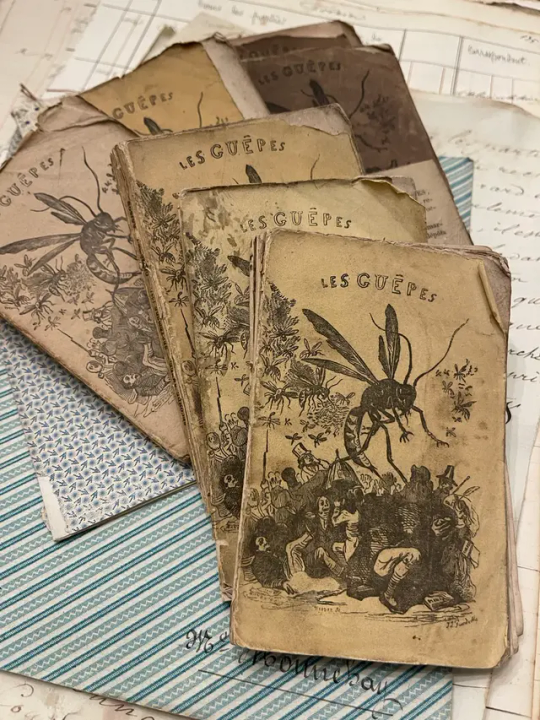
Les Guêpes. 1841.

Les Guêpes, Alphonse Karr. 1st May 1841. pp 60-61.
The satirical journal, Les Guêpes, wrote about Liszt’s role in the concert, which I will translate below:
Nowadays pianists play more for our eyes than for our ears, and pound the keyboard as though afraid that otherwise we would not know it is wooden. Almost every time M. Listz plays, a piano dies. At the last performance, he played standing up; he will play lying down next. But what do you want these poor devils to do, praise is their downfall. Lately, a man who is usually witty, said that he liked to see a pianist panting. It happens very often that M. Listz, when he has just performed his breathtaking music, finishes by letting himself fall unconscious onto his piano. This is entrancing.
At M. Chopin’s concert, which I did not attend, I was told that, once the piece was finished, M. Liszt, who was not playing the piano, but who insisted on playing some role, rushed towards M. Chopin to support him, thinking that he would faint.
Aftermath
Whilst the intentions of the article cannot be known for certain, d’Agoult’s letter to Liszt on 7th May 1841 reveals her pleasure that:
“The intention and performance of the Chopin review continue to be regarded as admirable.”
Equally, d’Agoult’s determination to no longer associate with Sand and I is evident in the following letter. Her argument with Sand had left her bitter and malicious.
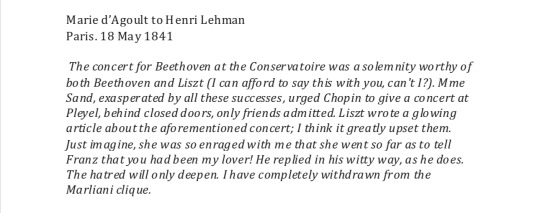
Although some point to other events as a cause for tension — such as when Liszt embellished one of my nocturnes in 1843, and the time he used my apartment for an affair in 1835 — it is clear that this concert was the pivotal moment. As is evident in the following letter, even my father was aware of the rift.
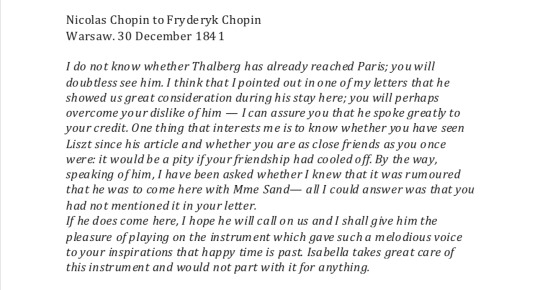
Conclusion
I hope this clears up any uncertainty regarding mine and Liszt’s relationship. Whilst we were initially good friends, our relationship deteriorated, largely due to his concert review, as well as tensions between our partners.
We still maintained a relatively civil relationship, and following my death, Liszt played a large role in the memorialisation of both me and my music. His biography, Life of Chopin, was first published in 1851 in La France Musicale. Although this in itself was controversial among some of my closest friends for the invasive questions Liszt had aimed during his research for the biography. Likewise, the biography is notable for its romantic and sensationalist tone, which further depicts me as a delicate “convolvulus” in contrast with Liszt’s passion and energy.
Personally, I rejected and still reject being consigned to this role. But it is up to the reader to decide whether there is right or wrong in this business, for I came to my conclusions almost 200 years ago. I write this article not to stir old tensions, or make much argument, but to compile what was said at the time and provide context on my relation to Liszt.
#frédéric chopin#franz liszt#fryderyk chopin#classical music#classical composers#romanticism#romantic era#19th century france#19th century paris#chopin#biography
27 notes
·
View notes
Text
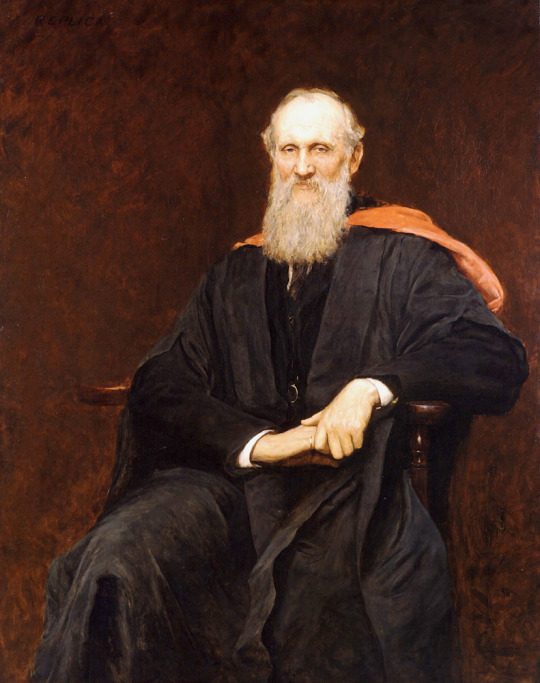
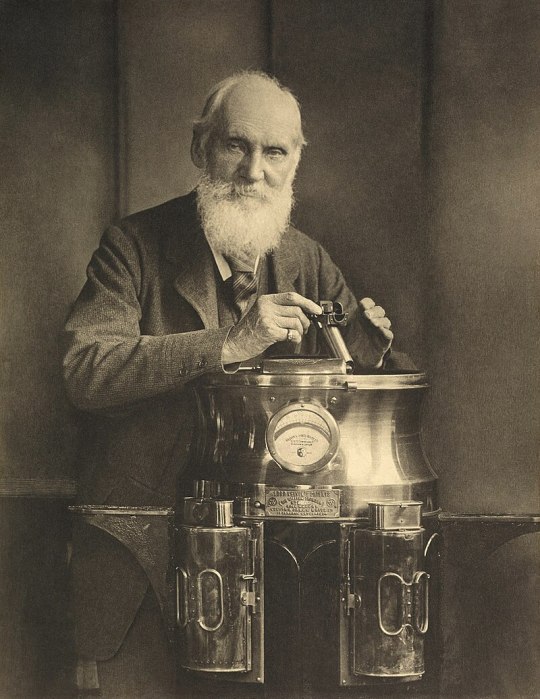

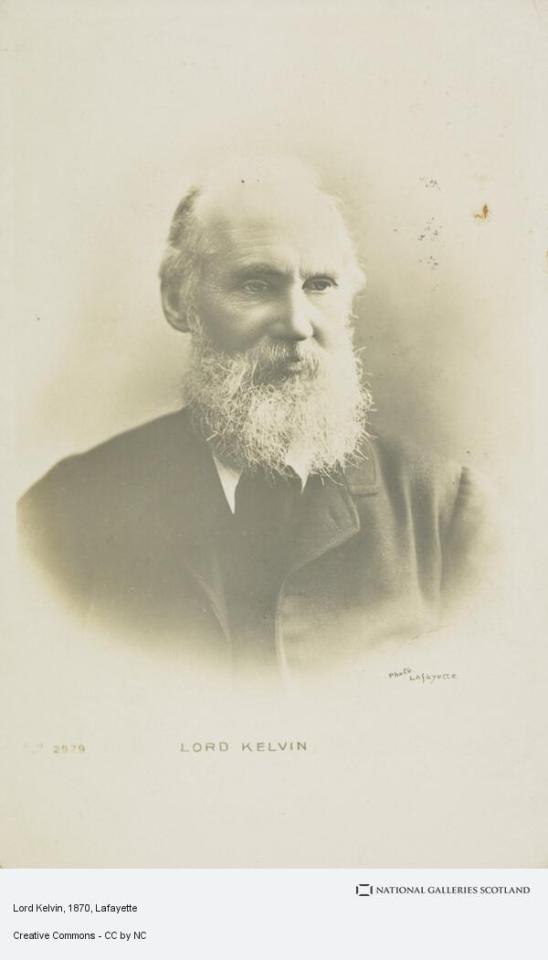

26th June 1824 saw the birth of William Thomson, Lord Kelvin, eminent physicist.
Although born in Belfast, Thomson was brought up in Scotland, his father was Professor of Mathematics at Glasgow University and his son took lesson there from the age of ten.
Kelvin attended university classes from the age of 10. He wrote his first scientific paper, under the pseudonym 'PQR', aged only 16.
In his teens he learned French well enough to read the work of eminent French mathematician Jean Baptiste Joseph Fourier. Philip Kelland, Professor of Mathematics at Edinburgh University, had criticised Fourier's work on the theory of heat. Kelvin boldly stated that Kelland was wrong – and later scientists agreed with him.
From 1841 to 1845 Kelvin attended Cambridge University. He was an excellent student – although he shocked his father by spending his allowance on a boat.
After graduating, Kelvin worked in a Paris laboratory with physics professor Victor Regnault.
Kelvin was influenced by the mathematical ideas of George Green, a self-taught miller's son from Nottingham.
He later brought an essay of Green's to the attention of fellow mathematicians and physicists by republishing it in a respected scientific journal. Until then the essay on mathematical analysis, electricity and magnetism had gone largely unnoticed.
In 1846, aged only 22, Kelvin returned to Glasgow to become Professor of Natural Philosophy. He remained in this post for 53 years. Keen to see students involved in practical experiment, he established what became the first university physics laboratory.
Kelvin continued to study the nature of heat. He realised that it would be useful to be able to define extremely low temperatures precisely. In 1848, he proposed an absolute temperature scale, now called The Kelvin Scale.
After further research, Kelvin formulated the second law of thermodynamics. This states that heat will not flow from a colder to a hotter body.
His interest in the transmission of electricity prompted Kelvin's appointment as Director of the Atlantic Telegraph Company in 1856.
The company was to install a cable under the Atlantic Ocean. Atlantic Cable Expeditions in 1857, 1858 and 1865 failed, but communication by cable finally succeeded in 1866.
Kelvin received a knighthood for his efforts in this project.
From 1870 onwards, Kelvin spent many summers on his yacht 'Lalla Rookh', and invented several marine instruments to improve navigation and safety.
He introduced a mariner's compass more accurate than any other in existence, and a machine to predict tide levels worldwide.
In 1884 Kelvin travelled to the United States to give a series of lectures. These were enthusiastically received, and were published in 1904 as the 'Baltimore Lectures'.
Kelvin became a Lord in 1892 and took the name Kelvin because of his Glasgow connections. By the time of his death in 1907, he was an international celebrity, widely respected and honoured.
His success as a synthesizer of theories about energy places him in the same position in 19th-century physics as Sir Isaac Newton has in 17th-century physics or Albert Einstein in 20th-century physics.
Lord Kelvin may have been a smart cookie, but, as seen in te last pic, he got the future of fllight way wrong, I wonder what he thought when the Wright Brothers flwq the first airplane four years before he passed away......
7 notes
·
View notes
Text
I really liked Mary Barton by Elizabeth Gaskell, especially the nuanced, sympathetic, and realistic portrayal of Manchester's working class. But then the main characters moved to Toronto, Canada to work at a foundry because he's an engineer and um...
I see a long, low, wooden house, with room enough and to spare. The old primeval trees are felled and gone for many a mile around; one alone remains to overshadow the gable-end of the cottage. There is a garden around the dwelling, and far beyond that stretches an orchard.
This is Toronto, Canada, circa 1850:
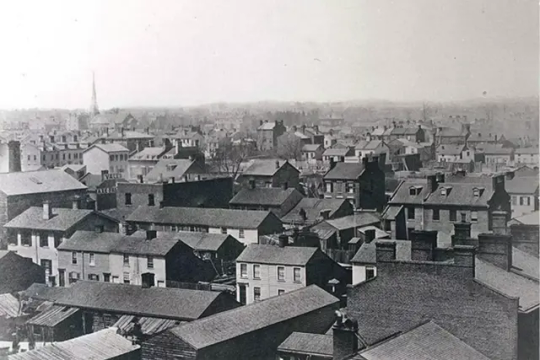

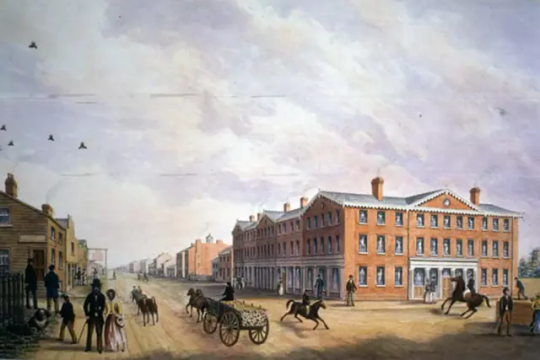
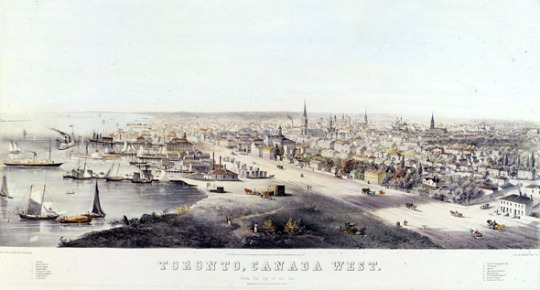
And Gaskell should have known this because she knew Charles Dickens and he visited!
In 1841, the first gas street lamps appeared in Toronto. Over 100 were installed that year, in time for author Charles Dickens' visit in May 1842. Dickens described Toronto as "full of life, motion, business and improvement. The streets are well-paved and lighted with gas." Dickens was on a North American tour.
I'm sure there were log cabins in rural Ontario but realistically, these people are in an apartment building.
#mary barton#toronto#history#I read this and I was like what?#canada#but Canada mention so I am obligated to be pleased#elizabeth gaskell#she wanted the romance of a homestead#but girl
35 notes
·
View notes
Text
Renoir and Manet: en plein air paintings and the casual blue striped dress
In mid 1800s Europe, the blue and white striped dress made from cotton piqués, cashmere, and lightweight wools, were a popular choice for ladies' seashore and picnic attire. Summer holiday dresses could be distinguished from morning and day dresses by these lighter fabrics and simple ornamentation.

Pierre-Auguste Renoir (French, 1841-1919) • Jardin - Sous la tonnelle au moulin de la Galette (In the Garden - Under the Arbour at the Moulin de la Galette) • 1875 • Pushkin Museum of Fine Arts, Moscow

1870s day dress, French

Edouard Manet (French, 1832 - 1883) • Argenteuil • 1874 • Musée des Beaux-Arts, Tornai, Belgium
In mid 1800s Europe, the blue and white striped dress made from cotton piqués, cashmere, and lightweight wools, was a popular choice for ladies' seashore and picnic attire. Summer holiday dresses could be distinguished from morning and day dresses by these lighter fabrics and simple ornamentation.

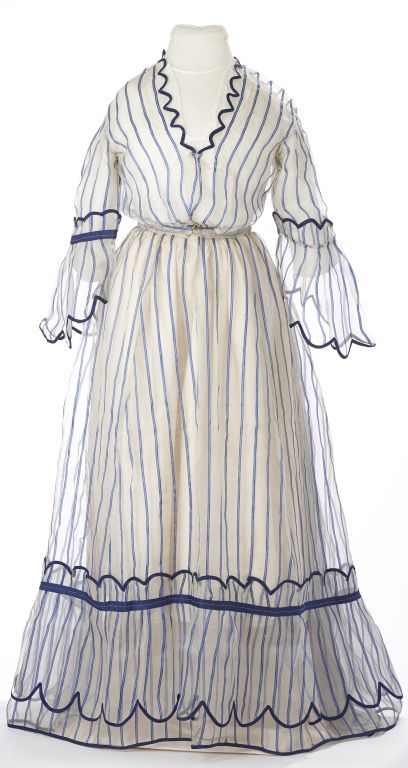
I always like to point out, though I'm certain it's obvious, that these fashions and how they were dictated was the mileau of the wealthy. The servants and other attendants that accompanied the ladies and gentlemen of the upper classes on holiday had to do make due with what they had: the lightest dress, an apron and a simple bonnet if their work took them out of doors.

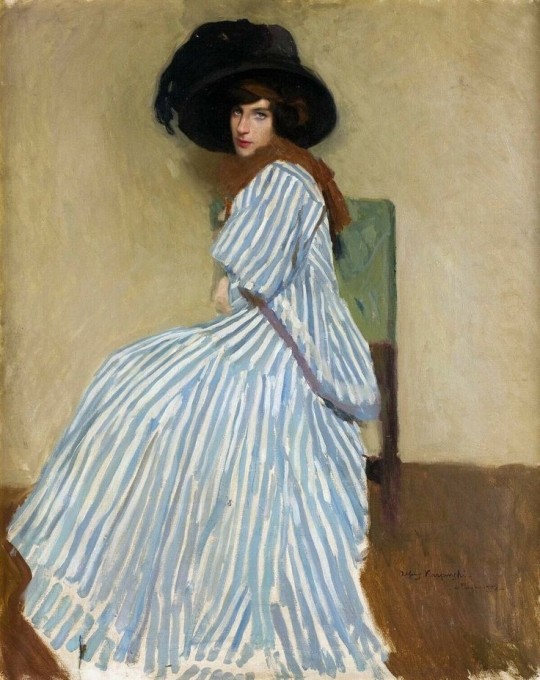
#art#fashion history#painting#edouard manet#impressionism#manet#renoir#victorian dresses#19th century summer dresses#mid 1800s blue striped dress#historic fashion#the resplendent outfit blog
49 notes
·
View notes
Text
Lulu Merle Johnson
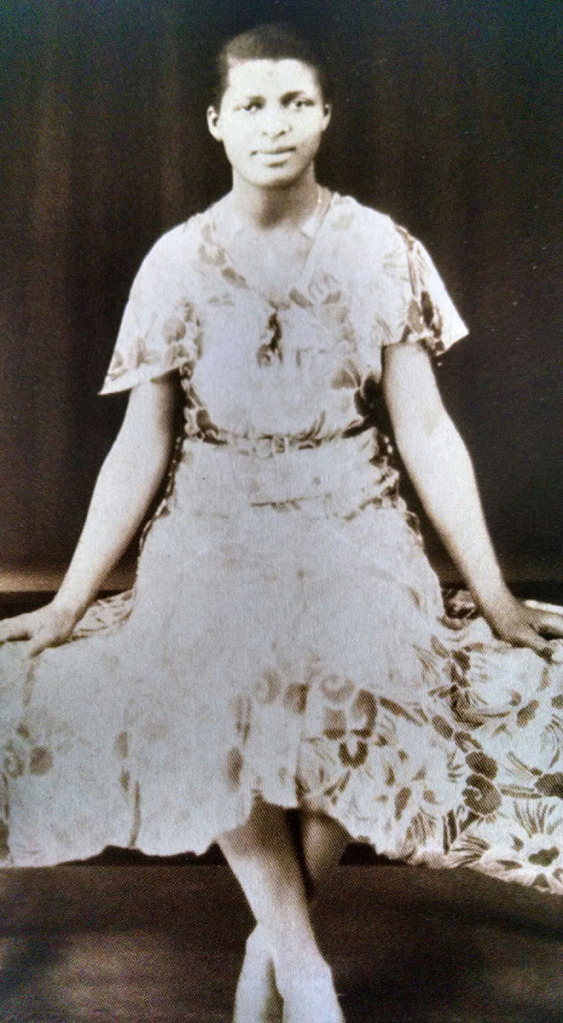
Lulu Merle Johnson was pioneer in education and the first African American woman to earn a Ph.D. in the state of Iowa. Born on September 14, 1907 in Gravity, Iowa to Jeanette (Burton) and Richard Johnson, her mother was the daughter of freed slaves, and her father, who was formerly enslaved, owned and operated his own barbershop. The family were the only Black residents in the town and were highly respected.
Johnson’s family moved to eastern Iowa when she was entering her senior year. In 1925, she graduated from Clinton High School, where she was captain of the girls’ basketball team. After graduation, Johnson enrolled at the State University of Iowa (now the University of Iowa). Out of over 2,000 students, there were only 64 Black students–14 women and 50 men. University housing was segregated, so Johnson and the other Black students had to reside in off-campus housing.
Lulu Johnson obtained all three of her degrees from the University of Iowa. She earned a Bachelor of Arts in history in 1929, followed one year later by a master’s. Throughout the 1930s, Johnson worked on a doctorate in American history. She received support from the Rockefeller Foundation.
Johnson, a member of the Alpha Kappa Alpha Sorority, challenged the university’s racial structure. As an undergraduate, she insisted on sitting in front row seats assigned to white students in her political science class. As a graduate student, she protested the university’s pool policies. All University of Iowa students were required to pass a swimming test. The university was willing to let Johnson as well as the other Black students waive the test in order to keep them out of the pool, so they would not have to drain and refill it for the white students. Johnson and the other students informed their instructor that they would attend class at 5:00 am and take the swimming test, making the pool unusable for the remainder of the school day. Her action ended the university’s racially-discriminatory pool policy.
In 1941, Lula Merle Johnson became the first African American woman to earn a Ph.D. at the University of Iowa. Her thesis was “The Problem of Slavery in the Old Northwest, 1787-1858.” She held academic appointments at a number of HBCU’s, including Talladega University in Alabama; Tougaloo College in Mississippi; Florida A&M; and West Virginia State College. In 1952, she accepted a position at Cheyney State College in Pennsylvania, where she was a history professor and dean of women. Dr. Johnson retired from Cheyney State as the director of the Department of Social and Behavioral Science. She moved to Millsboro, Delaware and spent the remainder of her life traveling with her partner, Eunice Johnson. She died on October 18, 1995, at the age of 88.
In 2018, the Graduate College at the University of Iowa established the Lulu Merle Johnson Fellowship, which provides funding and support for Ph.D. students from underrepresented racial and ethnic minority groups. On June 24, 2021, the Johnson County (Iowa) Board of Supervisors voted unanimously to change the county’s name to Lulu Merle Johnson County. The county was originally named for Vice President Richard M. Johnson (1837-1841), a slaveholder who never resided in Iowa and claimed credit for killing Shawnee Chief Tecumseh during the War of 1812. Lulu Merle Johnson County is only the second in the nation named after an African American. (The other is Martin Luther King County in Washington.) The University of Iowa, where Lulu Johnson received her education, is the county seat of Johnson County.
https://www.blackpast.org/african-american-history/people-african-american-history/lulu-merle-johnson-1907-1995/
56 notes
·
View notes
Text
10 Jewish Women from History Part 6
Fania Lewando (1888/1889-1941, Poland)
Born in Włocławek, in the Russian Empire, she and her husband moved to Vilnius during the Russian Civil War, where she became well known for her vegetarian restaurant in the Jewish Quarter. She also operated a cooking school. She published her Yiddish-language vegetarian cookbook, the first of it's kind in Europe, in 1938.
Grace Aguilar (1816-1847, England)
Born to a family of Sephardic Portuguese descent, she was the eldest child of her parents. Her father was the lay leader of a synagogue in London, and her mother was active in the Jewish community. Due to an illness, she was educated at home by her mother, who taught her Jewish tradition and history. Her debut was an anonymous collection of poems. In London, she befriended Benjamin Disraeli. She continued to write until her death. Most of her work was published posthumously. A lot of her work focused on equipping Jewish women with religious knowledge against missionaries.
Charlotte Montefiore (1818-1854, England)
A British Jewish author and educational philanthropist, she was the second of four children in the Montefiore family. She devoted herself to charity and supporting Jewish schools, and founded several Jewish organizations like the Cheap Jewish Library (with Grace Aguilar), the Jewish Emigration Society, and the Jewish Ladies' Benevolent Loan and Visiting Society. The Cheap Jewish Library, Dedicated to the Working Classes was a periodical from 1841-1849, with Charlotte Montefiore and Grace Aguilar being the main authors. It is viewed b some as the beginnings of a Jewish women's movement in England.
Esterka (1300s, Poland)
A semi-legendary (as in, some consider her to be real and other consider her to be myth) mistress of Casimir the Great, King of Poland. The daughter of a poor tailor, she was known for her beauty and intelligence. In legend, she performed as the king's advisor, and encouraged him to be loyal to the Jews, especially during the Black Death. She has two daughters who she raised as Jews. She is featured in several pieces of literature and art.
Judith Solomon Cohen (1766-1837, Baltimore)
The matriarch of one of the earliest Jewish families in Baltimore. Born in Bristol, England, she and her husband emigrated to Richmond, Virginia, by 1784. Her husband was the founder of a congregation. When he died, his house and belongings were auctioned off as women could not own property. Cohen and her children vecame a boarder of Shinah Solomon Etting.
Grunia Movschovitch Ferman (1916-2004, Poland and Canada)
A WWII fighter, nurse, businesswoman, and Holocaust activist, she was born in Novogrudek. She trained in first aid courses and trained as a physical education teacher. She was forced to live in a ghetto, which she escaped from, finding refuge in Naliboki Forest where she joined a camp of Jewish resistance, working as a nurse. She spoke nine different languages and acted as a translator for the community, often volunteering at hospitals. She was involved in Holocaust remembrance events in St. Johns, and presented a lecture in response to Holocaust deniers.
Gluckel of Hameln (1646-1724, Germany)
A German Jewish businesswoman and diarist, whose memoirs are the only known pre-modern ones in Yiddish written by a woman. Born to a wealthy family in Hamburg, her father was a leader in the Jewish community, and her mother involved in business. In 1649, she and her family were expelled to Altona. Although unable to study Torah, she received education in Hebrew and the basics of Judaism. Gluckel assisted her husband in his business, eventually taking over when he died. She was one of a few women who travelled on their own to conduct trade at European markets and fairs. Her diaries capture German-Jewish life in the late seventeenth and early eighteenth centuries.
Esther Liebmann (1649-1714, Germany)
A German financier and court Jew of King Friedrich I of Prussia, a title she inherited from her second husband. She served as court jeweler, carried on her husband's business and becoming the minting official for the crown. She was known as the most powerful woman in the country.
Tabitha Solomon (1901-1976, Calcutta)
One of the first women to qualify as a dentist in India. After graduating from Calcutta Dental College and Hospital in 1928, she started a dental clinic. Born into the Baghdadi Jewish community of India, she was closely involved in Jewish causes, serving on WIZO, the Calcutta Jewish association, and the Calcutta Women's Committee.
Sylvia Weinstock (1930-2021, America)
An American baker and cake decorator, born in the Bronx and raised in Williamsburg. She completed a degree in psychology from Hunter College, and a masters in education from Queens College. She started as an elementary school teacher on Long Island, and then apprenticed with pastry chef George Keller. SHe started her own baking and decoration company at 50 years old, after surviving breast cancer. She made decorative cakes for a variety of celebrities, avoiding using fondant. She was dubbed the Leonardo da Vinci of wedding cakes, and later appeared as a guest judge on Food Networks shows. She taught cake decorating at the Institute of Culinary Education.
11 notes
·
View notes
Note
I’m not looking for any specific fics, but Season 2, for some reason, has me itching for Really Rich Aziraphale and Escort!Crowley. Maybe Businessman!Aziraphale??
You can check our #sugar daddy au and #sex worker crowley tags for fics you'll enjoy. Here are more in which Aziraphale is a man of means...
The Hand That Feeds You by saretton & TawnyOwl95 (E)
1950s. When Dr Fell takes on queer sex worker Anthony Crowley to help with his illicit research on the physiological aspects of homosexuality, neither of them had imagined that things were about to get so personal. The things one does for science.
Prince and a Prostitute are so titled when chained together by Augenblickgotter (E)
Crowley is a smart streetwise and very attractive prostitute that had been working his trade in the commune of Tadfield. Life took a sharp turn for his line work and is even harder now that his chained in a dungeon with injuries. A naïve young high class man enter his life and may or may not be the key to escape, even if they can't seem to stand each other. Initially.
Love For Sale by ranguvar82 (E)
Baron Aziraphale Fell has no time nor inclination to form any sort of relationship. He simply wants sex. To that end, he routinely hires a monthly companion. This way, there's no strings, no feelings, and no problems. This routine has served him well. But then Madam Tracy, the owner of the brothel he frequents the most, sells him Anthony Crowley, and the Baron can't help but be fascinated by the fiery redhead. Anthony is a Rose, a highly trained and skilled escort. He knows just how to behave, how to be Baron Fell's perfect companion and lover. He just wishes he knew what to do about the fact that his heart races every time Baron Fell smiles at him. A tale of love for sale, love for rent, and how even the most jaded can still fall.
what i call life (what would you do?) by Vagabond (E)
Crowley lives a life of indentured servitude to Lucifer, a man who runs an escort and companion service. His life is one client after another, until a man named Aziraphale Fell hires him to be a companion at a sibling's wedding. Crowley had no idea that this chance encounter would put him on a path to freedom, and, just maybe, to finding love.
The Prince's Consort by IneffableToreshi (E)
Anthony Crowley has spent the majority of his life in Lucian's brothel, being specially trained and kept 'pure' for his eventual master. When he is finally purchased - despite Lucian's true wishes - he finds his world being very dramatically turned on its head. Not only has he been purchased for the man who will be the most powerful in the kingdom, but he also, unexpected, finds himself falling head over heels in love.
Temple of the Muses by AJ_Constantine (E)
It’s the start of the Season in 1841 Victorian England. Mr Anthony Crowley has left a life of working at a luxurious high end bordello in Paris behind him and is now a courtesan intent on climbing the social ladder in London to increase his status and social connections. After unexpectedly inheriting the title of the Earl of Eastgate, Aziraphale finds himself trying to navigate the complicated world of the aristocracy. Duke Gabriel purchases a month-long contract with Mr Crowley for Lord Fell as a surprise gift to Aziraphale’s astonishment and dismay. He declines to take full advantage of Crowley’s charms but agrees to an arrangement of pretending to be Crowley’s paramour in exchange for lessons on the etiquette and expectations of Society. It’s a practical arrangement, nothing more. Certainly no feelings will be involved...
- Mod D
55 notes
·
View notes
Text

Sketches of the Higher Classes of Colored Society in Philadelphia, first published in 1841, was written by Joseph Willson, a southern black man who had moved to Philadelphia. He wrote this book to convince whites that the African-American community in his adopted city did indeed have a class structure, and he offers advice to his black readers about how they should use their privileged status. The significance of Willson’s account lies in its sophisticated analysis of the issues of class and race in Philadelphia. It is all the more important in that it predates W. E. B. Du Bois’s The Philadelphia Negro by more than half a century.
Julie Winch has written a substantial introduction and prepared extensive annotation. She identifies the people Willson wrote about and gives readers a sense of Philadelphia’s multifaceted and richly textured African American community. The Elite of Our People will interest urban, antebellum, and African-American historians, as well as individuals with a general interest in African-American history.
This volume has withstood the test of time. It remains readable. Joseph Willson was well read, articulate, and had a keen eye for detail. His message is as timely today as it was in 1841. The people he wrote about were remarkable individuals whose lives were as complex as his own.
22 notes
·
View notes
Text
Examination of Midshipmen entitled to pass for a Lieutenancy when his ship is on detached service
What to do if you want to take your exams as a midshipman but your ship is no longer on duty - well, that's what this section from an Admurality Memorandum explains
Admiralty Memorandum,
17 Dec 1841
The Lords Commissioners of the Admiralty direct that in cases of a Midshipman having completed the required time to entitle him to pass for a Lieutenancy, when the ship to which he belongs shall happen to be detached, so as to prevent his obtaining at the moment an examination according to the established regulations, the Captain or Commander of the said ship in which such Midshipman may be serving, with the senior Lieutenant or second officer, and the Master or Second Master (according to the class of ship and the rank of officers on board of her) assisted by the Naval Instructor, if there may be one on board, may proceed to examine such Midshipman as to his qualifications to perform the duties of a Lieutenant, and if they find him to be in their opinions duly qualified, they are to give him a certificate to that effect, dated on the day of such examination, and the Captain my forthwith give him an acting order as Mate, and if on the first opportunity that shall afterwards offer for his being re-examined according to the established regulations, he passes successfully, his rank as Mate shall be enrolled according to the date of his first provisional certificate above ordered.
43 notes
·
View notes
Text

King Edward VII (1841-1910) at races , one of his loved elements together with house and shooting parties. Differently from his parents Queen Victoria and Prince Albert who considered horse racing and house parties decadent, in his younger years as Prince of Wales with plenty of money ‘Bertie’ made his vision of life, full of pleasures, the fashionable trend of the British Society , thus leading it out from the severe Victorian Age. Great aristocrats and High Society members immediately followed the Prince and his desires, as a friendship with him was the best guarantee of social success. That was the start of the Edwardian era ( 1860s-1914), during which all the main components of the elegant way of life of the British Aristocracy and upper classes were established and became major events and traditions :during the Season race meetings such as Epsom , Royal Ascot, Newmarket and Goodwood with the involvement of ladies that were expected to talk about racing and to be well dressed at races; after the Season (August and September) country house and shooting parties in which the host and the hostess had to supply rooms in their homes for all the guests and the guest’s maids and footmen as well as meals ,outdoor sports activities in addition to shooting such as tennis, cricket, golf, and evening balls. That kind of gatherings has been so perfectly described in Gosford Park movie by Robert Altman (2002). This Edwardian way of life has had also a great influence on the classic menswear history as fabric patterns and cloth styles, which had origin in country wear, were subsequently adopted, in a beautiful admixture of the two clothing worlds, also for town wear with particular regard , but not exclusively, to informal occasions such as attending sports events, leisure strolling and traveling. This is another relevant legacy left to us by Edward VII , King of the United Kingdom and the British Dominions, and Emperor of India , whose world ended with the start of the World War I ( 1914-1918).
41 notes
·
View notes